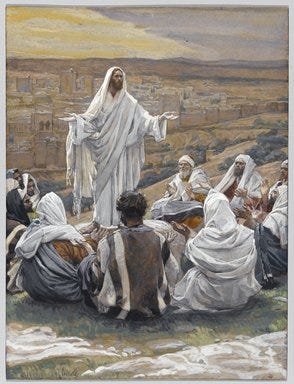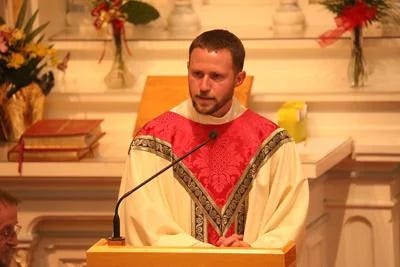One of the most important lessons that I’ve learned as a priest is that it’s often not that we feel as if God won’t forgive us but rather that we cannot forgive ourselves.
I often challenge people with the reminder that God forgives them but they must also forgive themselves. I often encourage them to follow God’s lead which is one of mercy, compassion, and forgiveness.
It’s profound for a soul to hear the words of absolution, “God, the Father of mercies, through the Death and Resurrection of his Son, has reconciled the world to himself and poured out the Holy Spirit for the forgiveness of sins; through the ministry of the Church may God grant you pardon and peace, and I absolve you from your sins in the name of the Father, and of the Son, and of the Holy Spirit. Amen.”
It’s also profound for a soul to follow God’s lead and forgive oneself for wrongdoings. I have come to learn that for some people this last step is quite difficult.
With this in mind, I would like to focus on Matthew 5:20-26 and consider some of Christ’s words concerning forgiveness. Jesus uses language such as opponent, judge, guard, and prison while referring to reconciling with another.
Could it be that we are the “opponent” when we refuse to forgive ourselves for something that occurred in the past? We become our own worst enemies when we beat ourselves up for a mistake, a failure, or a bad decision that we regret.
Could it be that we are the “judge” when we refuse to look honestly at ourselves and, instead, quickly judge? We may say things to ourselves that we would never dare to say to another person. As a result, we may make these types of judgments: “You are a failure.” “You are worthless.” “You have never lived up to who you should be.” “How could you be so stupid, inconsiderate, useless, unprepared, etc.”
Could it be that we are the “guard” when we refuse to allow God into that dark space within our hearts? We guard this weakened area with reckless abandon. We also don’t let loved ones, friends, or anyone for that matter into this space. We don’t allow for healing and we guard this space at all costs. We let the dust of time collect on this unforgivable spot on our souls hoping that this artificial blanket will cover the mess. We don’t let the light of grace reach this area. It would hurt too much to let our guard down and let someone in to heal us. We are even scared that the light of grace would show how dark things really are.
Could it be that we are the “prison” within us? Maybe we are our own worst critics. Maybe the opponent and the judge are the same person as the one in the mirror. Maybe it’s time for the guard to hand the keys over to God. Maybe it’s time to unlock these doors and let forgiveness, compassion, and mercy enter into the prison within us.
Again, I often have to remind people that God forgives them but they must follow suit. I then ask them, “Are you willing to follow God’s lead and extend forgiveness to yourself as well?”
This means ceasing to be an opponent, a judge, a guard, and a prison. It means being a beloved son/daughter of God. It means handing over the keys to God and saying,
“You can enter into the deepest, weakest, and darkest places of my soul. Help me to see others as You see them. Help me to also see myself as You see me. You have not created me to be an opponent, a judge, a guard, or a prison. Instead, You have called me to be a forgiven and forgiving sinner, a saint.”
Fr. Ben Daghir










